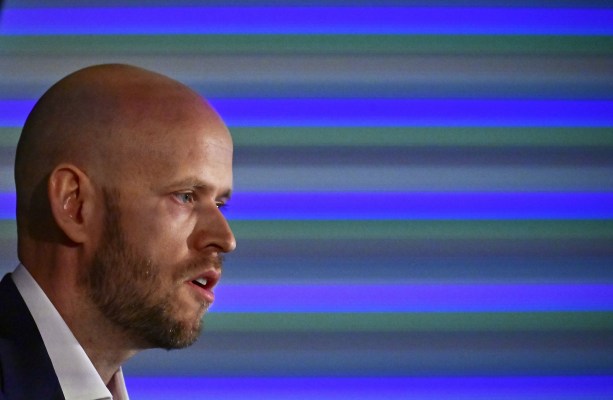Spotify, a notable Apple critic, unsurprisingly came out swinging after Apple announced how it was complying with the EU’s new regulation, the Digital Markets Act, or DMA, calling Apple’s plan “extortion” and a “complete and total farce.” But on its Q4 2023 earnings call with investors, Spotify CEO Daniel Ek took a more muted tone concerning the new law, saying that there’s no real downside to its business, from an investor standpoint, as companies can remain on their current terms with Apple, and in fact, there are potential “future upsides, that could be quite significant.”
The streamer is one of many vocal critics of the new law, joining others like Epic Games, Mozilla and Microsoft which have raised concerns about Apple’s implementation.
Though Apple is complying with the letter of the law — which forces Apple to open up its app ecosystem to new app stores and other payment mechanisms — it’s definitely not complying with the spirit of the law, meant to foster greater competition. Instead, Apple’s complicated new terms involve a new Core Technology Fee, which requires developers to pay €0.50 for each first annual install per year over a 1 million threshold, regardless of their distribution channel. It will also take a commission on digital goods and services that take place on a developer’s website within seven days of a user tapping through an in-app link for external purchases.
Ek immediately blasted Apple on social media after its terms were announced, calling Apple’s solution a “masterclass in distortion” and warning that Spotify could “not afford these fees” if it wanted “to be a profitable company.”
To investors on the quarterly earnings call, he reiterated this stance, saying that Apple’s solution was a “farce” that “no sane developer” would want to choose. However, he downplayed any negative impact Apple’s rules would have on Spotify’s business or revenues.
“I know that there initially was some questions about whether or not this would be a downside for Spotify. I don’t think that’s the case. So, you know, we still have the ability to be on the old terms, and keep going as we’re currently going,” Ek said. In other words, nothing is changing for Spotify in the near term as the new law goes into effect.
In addition, the CEO suggested some pluses could emerge from the new competitive landscape, adding that there are “future upsides” to the new rules that could be “quite significant.” The company had hinted before about its plans in a blog post, saying that the DMA would allow for things like superfan clubs and alternative app stores, and would give creators the ability to download the Spotify for Artists app and Spotify for Podcasters app directly from its website. (This was the first time Spotify mentioned superfan clubs, in fact.)
In addition, the company had earlier said that the loosened rules would mean it could communicate to customers in its app about “new products for sale, promotional campaigns, superfan clubs, and upcoming events, including when items like audiobooks are going on sale,” the blog post read.
Ek again confirmed that’s the case, as he told investors that fan clubs were among the things Spotify could leverage the new rules to enable, which is something it couldn’t have done before because doing so would have made all of Spotify unprofitable. In addition to fan clubs, the CEO also suggested that, given proper regulations, Spotify could take advantage of its own in-app purchases on things like audiobook purchases or top-ups of hours — things that could be “quite meaningful” for Spotify’s revenues, given that it currently it has to share a 30% cut of those with Apple.
Spotify today still struggles to turn a profit, which is why it wants to keep as much of the in-app revenues as it can. Last quarter, it turned a rare profit of €32 million, but this quarter it came in at a loss of €70 million — though that’s down from €270 million a year ago.
“Some of these more innovative things that we would like to do, we’re currently restricted in doing on the iOS ecosystem,” he said. “So obviously, my hope is still very much that the European Commission will take action and allow this to happen,” he said seemingly referring to both the March 7 implementation of the law and the possibility that the Commission could force Apple to revise its changes. He noted that it would then be “far greater for the ecosystem, both for consumers and creators alike.”
Update, 2/6/24, 2:45 PM ET, Apple emailed a statement in response to Ek’s comments (see below). The company also noted that Spotify pays Apple nothing and can continue to do so, even under Apple’s DMA compliance plan.
“We’re happy to support the success of all developers — including Spotify, which has the most successful music streaming app in the world. The changes we’re sharing for apps in the European Union give developers choice — with new options to distribute iOS apps and process payments. Every developer can choose to stay on the same terms in place today. And under the new terms, more than 99% of developers would pay the same or less to Apple.”
